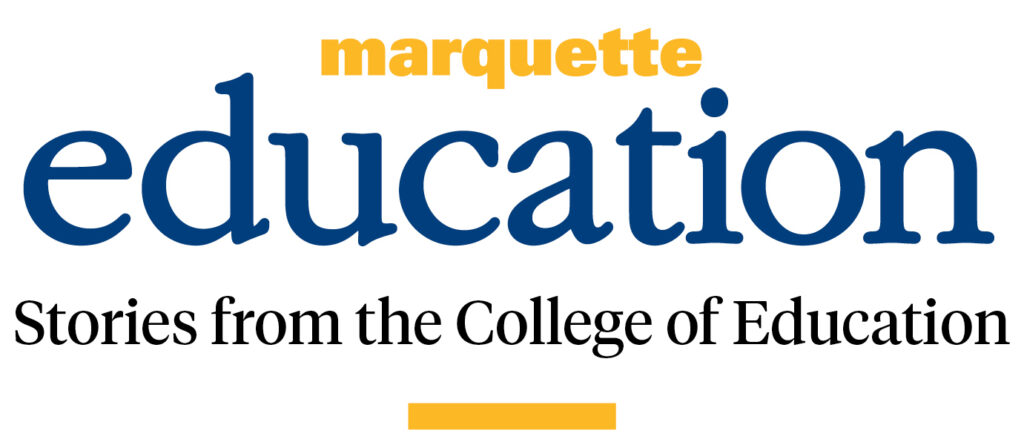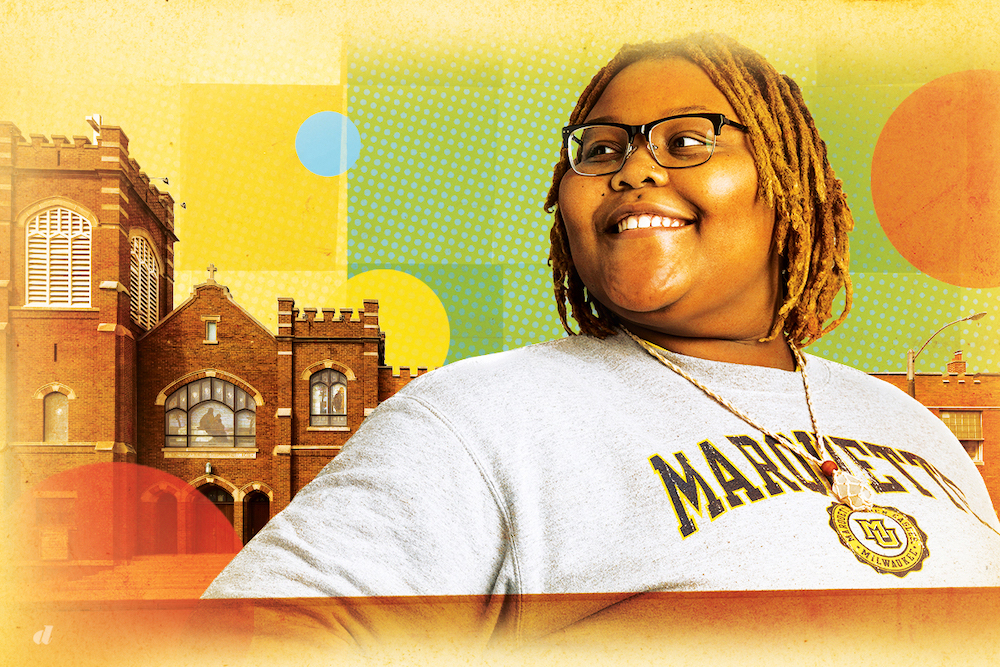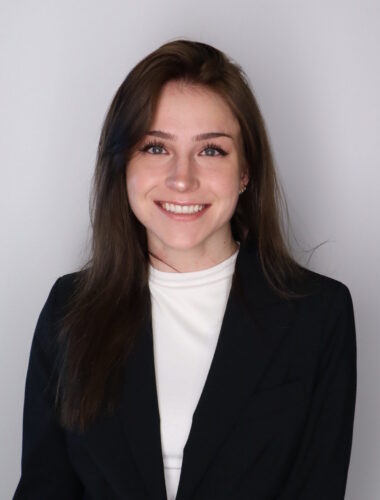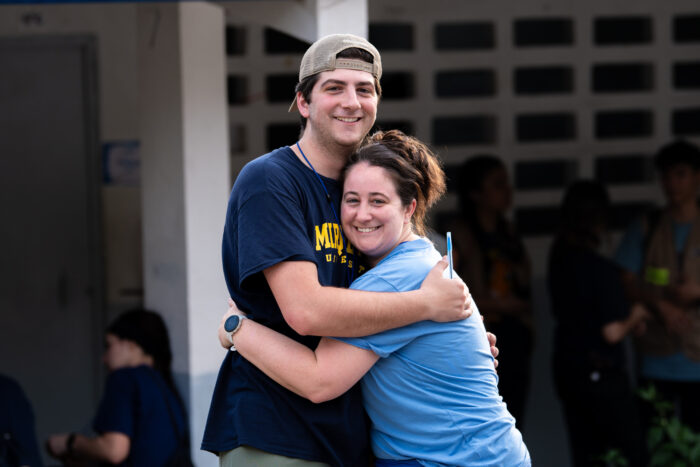The Educational Studies program offers Marquette students a nontraditional pathway – one related to education, but beyond the classroom. Graduates of the program become guidance counselors, psychologists, nonprofit administrators — and take the plunge into graduate school. Since the program started in 2017, it has grown from eight students to more than 40 majors and minors by fall 2022.
Gwendolyn Lazenby always knew she wanted to teach. When she came to Marquette as an undergraduate, she enrolled as a secondary education major. Her plan: become a high school math teacher.
But as she started her course work, Lazenby started to have second thoughts. “I really liked working in education but didn’t feel like I wanted to teach,” Lazenby says. “I like helping students outside of the classroom. I realized that I couldn’t do that while teaching specific lesson plans that follow the general education curriculum.”
During her junior year, Lazenby switched her major to educational studies. The program prepares students for careers in nontraditional teaching settings. Graduates have gone on to work in schools as guidance counselors and psychologists; others have pursued careers in nonprofits. Many use the degree as a launching pad for graduate studies in counseling, social work and other fields.
“I like helping students outside of the classroom. I realized that I couldn’t do that while teaching specific lesson plans that follow the general education curriculum.”
Gwendolyn Lazenby
For Lazenby, the major provided a pathway to an internship in a non-classroom role at a local school, where she helped connect students to community resources so they could be present and focused on their learning.
The Educational Studies program is part of the College of Education, but it isn’t narrowly focused on classroom teaching, explains Dr. Julissa Ventura, assistant professor and coordinator of the Educational Studies program. “We believe that educational studies majors are also community educators,” Ventura says. “They might not be teaching, but they might be in a community organization where they’re facilitating lessons, or they might be a counselor facilitating social-emotional learning.”
Like Lazenby, Ventura also started college certain that she would become a teacher. Instead, she became an educational studies major at Swarthmore College in Pennsylvania. She followed a path that led to education research and a career in higher education.
A flexible avenue to education careers
At Marquette, educational studies students take the same foundational courses as primary and secondary education majors. By junior year, their paths diverge — educational studies students round out their course work with classes from the business school, like Diversity in Organizations. Many students choose electives from across departments, exploring topics from anthropology to psychology.
“Our major and minor is very flexible,” Ventura says. “It gives students more choice in terms of how they’re prepared for either going on to graduate school or an education role that’s outside of the teaching role.”
Since the program started at Marquette in 2017, it has grown from just eight students to more than 40 majors and minors in fall 2022.
“Increasingly, there’s more awareness about how our schools need support staff that goes beyond teaching,” Ventura says. “Our students are realizing that if they want to be a school counselor or social worker, having an education background would be good before applying to those master’s programs.”
Hands-on in the community
The major also provides students with real-world work experience. Rather than student teaching, educational studies students complete a community-engaged internship for at least one semester. Placements have included local schools and nonprofits, such as the Boys & Girls Clubs, FoodRight and the Milwaukee Center for Independence.
Over the course of their internships, students develop projects that meet a specific need for their assigned sites. They also attend Ventura’s biweekly seminars to discuss challenges and share their experiences with other students.
Last fall, Lazenby interned at El Puente High School on Milwaukee’s south side and worked alongside the school’s student support specialist. For her final project, she compiled a resource binder that the school uses to connect students and their families to everything from after-school and summer programs to information about local food pantries.
For many students at El Puente, it can be hard to zero in on schoolwork when they’re also taking care of younger siblings, helping a sick family member or making money for their families, Lazenby says.
“I created the resource binder because there are resources within the communities that a lot of students could use to help them take some of the responsibilities off their plate and leave them more time to focus on school,” she says.
At the end of their internships, students created a poster to present at the fall 2022 Educational Studies Showcase hosted by the College of Education and attended by internship supervisors, friends, family, and Marquette faculty and staff. Student projects have included creating strategies to engage younger audiences at the Pabst Mansion in Milwaukee; increasing student awareness of Denim Day — an annual show of support for sexual assault survivors — for the Marquette Wellness Center; and evaluating the impact of virtual classes at FoodRight, a nonprofit that partners with Milwaukee Public Schools to provide food and nutrition education.
“There’s this myth that the College of Education is (only) for teachers, but it’s also for others who are interested in different education roles. I share my story with my students so they know sometimes the path is a little more winding, and that’s OK.”
Dr. Julissa Ventura
Partnerships between students and local organizations are mutually beneficial, says Renee Morrow, co-director and Special Needs Scholarship Program coordinator at El Puente.
“Working amongst and alongside community partners allows interns to see the day-to-day reality of what is happening in their city,” Morrow says. “This firsthand knowledge of community organizations and how they function will serve Marquette interns well as they navigate college and life after graduation.”
For alums like Mei Lin Nall, Arts ’21, internships have also led to job opportunities. As an intern at St. Augustine Preparatory Academy in 2020, Nall built a framework for a monthly newsletter that went out to members of the school community. Upon graduating, the school hired Nall as a teaching fellow — a role designed for people with bachelor’s degrees who are on the path to becoming educators.
Now, Nall is applying to graduate programs in school psychology. “The Educational Studies program gave me the flexibility to find and take classes that interested me and got my foot in the door, while also allowing me to spend time in schools to determine if this was really something that I wanted to do,” Nall says. “Hopefully I will be able to become a licensed school psychologist and continue to work within a school, in a role different from a classroom teacher.”
Ultimately, the program provides students with an avenue to a career in education — whether or not that’s in a school setting.
“There’s this myth that the College of Education is (only) for teachers, but it’s also for others who are interested in different education roles,” Ventura says. “I myself thought I would be a teacher before I had this educational major that opened up a lot more options for me. I share my story with my students so they know sometimes the path is a little more winding, and that’s OK.”
Learn more about the Educational Studies undergraduate program.




